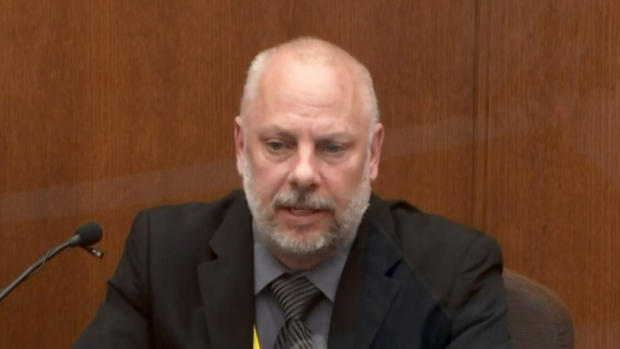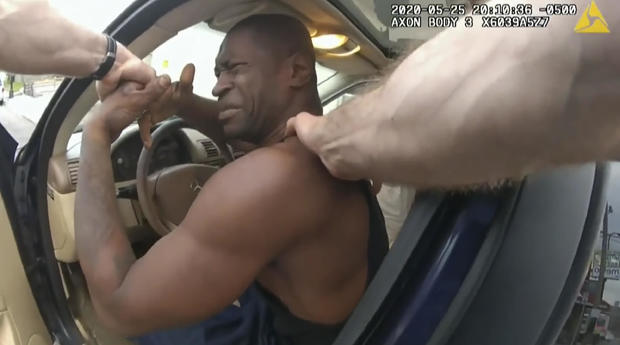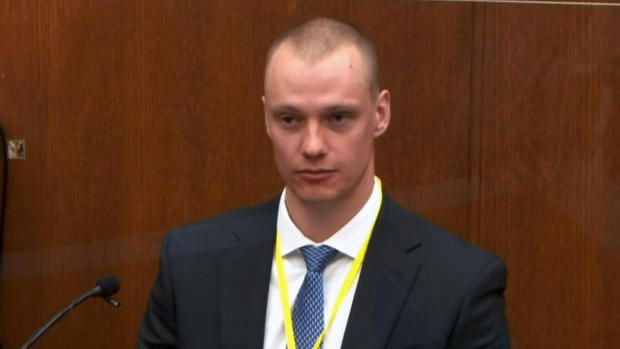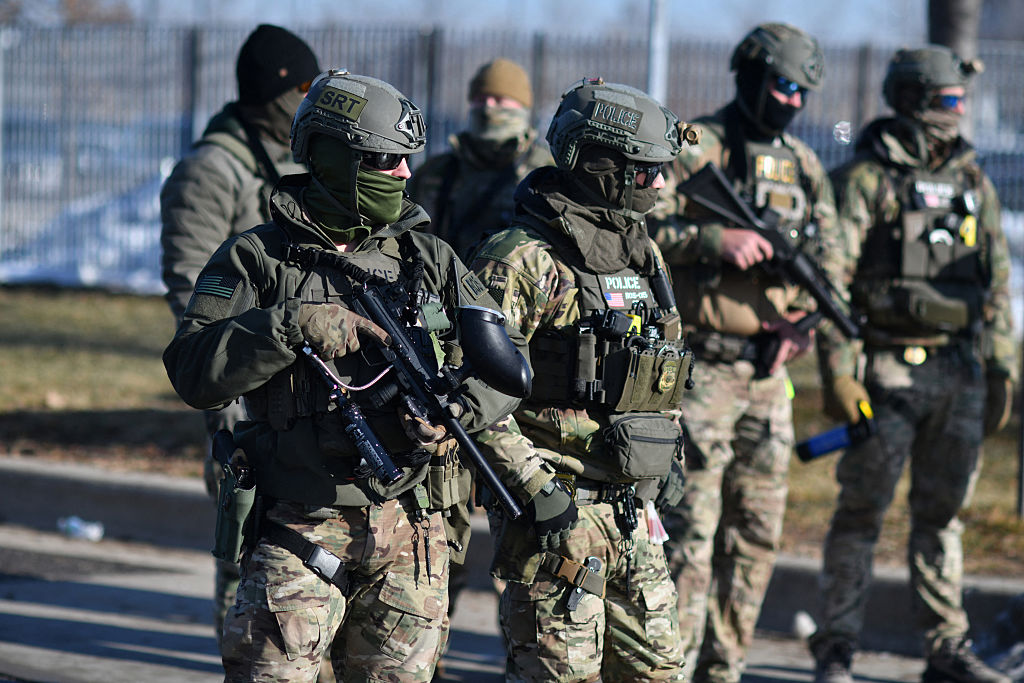Derek Chauvin Trial 4/1/21: Police supervisor testifies officers "could have ended their restraint" against George Floyd
Follow the latest trial updates here. Earlier coverage is below.
Prosecutors continued to lay out their case Thursday against Derek Chauvin, the fired Minneapolis officer charged in the death of George Floyd. Chauvin, who was seen in disturbing videos kneeling on Floyd's neck for more than nine minutes, is charged with second-degree murder, third-degree murder and second-degree manslaughter. He has pleaded not guilty.
The proceedings on Thursday ended with the testimony of Chauvin's police supervisor, retired Minneapolis Police Sergeant David Pleoger, who testified that the officers' use of force against Floyd could have ended once the man stopped resisting.
Pleoger testified that he called Chauvin after receiving a concerned call from a 911 dispatcher who had been watching the arrest on surveillance camera. Prosecutors played a portion of the call in court, in which Chauvin is heard saying, "We had to hold a guy down. He was going crazy...wouldn't go in the back of the squad."
Pleoger said Chauvin didn't tell him on the call he had pressed his knee into Floyd's neck, but told him later at the medical center where Floyd was pronounced dead.
Earlier in the day, George Floyd's girlfriend Courteney Batya Ross gave emotional testimony. She broke down in tears as she spoke about their relationship, saying they first met in August of 2017 in the lobby of the Salvation Army where Floyd worked as a security guard. Ross described Floyd as a "mama's boy" who was devastated by his mother's death in 2018. She also described him as an active person who liked to lift weights and play sports.
Asked to identify a photo of Floyd, she sobbed, and then laughed through tears as she described it as a "dad selfie."
Ross also described how they had both struggled with opioid drug use. She said they had each gotten addicted after being prescribed medication.
"It's a classic story of how many people get addicted to opioids. We both suffered from chronic pain. Mine was in my neck and his was in his back," Ross said. "We both had prescriptions. But after prescriptions that were filled, we got addicted and — and tried really hard to break that addiction many times."
She said both had quit the drugs for a period of time in March of 2020, but by May she suspected Floyd was using drugs again because of "behavior changes."
Defense attorney Eric Nelson honed in on Floyd's drug use, asking Ross about an overdose he suffered in March 2020. Nelson also asked whether Floyd bought drugs from his friend Morries Hall, who was in the car with Floyd before his fatal arrest, including pills about a week before his death that Ross said had a strong stimulant effect. Ross said she suspected Floyd had bought the pills from Hall, but didn't know for sure.
After Ross stepped down, two paramedics took the stand, testifying about attempting to revive an unresponsive Floyd.
"He's a human being, and I was trying to give him a second chance at life," paramedic Derek Smith said.
Ultimately, the paramedics testified, their efforts were unsuccessful.
The first three days of testimony included firsthand accounts of Floyd's fatal arrest from a series of eyewitnesses, some of whom cried and described feeling helpless as the unarmed Black man struggled for air. On Wednesday, jurors watched a series of police body camera videos showing the fatal encounter.
Three other officers involved in the fatal arrest are charged with aiding and abetting, and will be tried jointly in August.
Court adjourns for the day after police supervisor's testimony
Court has recessed for the day. Testimony is expected to resume at 9:15 a.m. local time (10:15 a.m. ET) Friday.
Thursday's session ended with defense attorney Eric Nelson cross-examining Chauvin's supervisor, former Minneapolis Police Sergeant David Pleoger. Nelson asked whether Pleoger had dealt with crowds of people who form to watch police activity and film on their cellphones. Pleoger said that he had, and that as an officer that causes him concern.
Pleoger also confirmed that officers are trained to be careful when someone comes out of unconsciousness, because they can be more combative. Responding to Nelson's questions, Pleoger said he agreed that officers sometimes have to do very violent things.
Judge Cahill indicated earlier that proceedings were moving ahead of schedule, and that he would release the jury just after noon on Friday. It wasn't clear whether proceedings would continue Friday afternoon involving just the legal teams.
Former police supervisor: Officers should have ended restraint sooner
David Pleoger, the former shift supervisor in the Minneapolis Police Department's third precinct, said he responded to the scene, where he instructed Chauvin to try to gather witnesses. On Pleoger's body camera video, Chauvin is heard saying, "We can try. They're pretty hostile."
Pleoger said he then responded to the Hennepin County Medical Center, where Floyd was taken, and learned that he had died. Chauvin and fellow officer Tou Thao were at the medical center as well.
Earlier, Pleoger testified officers in the department are trained about the dangers of "positional asphyxia," breathing complications that can result when someone is restrained in the prone position. Pleoger, who is now retired, said officers are trained to place restrained individuals in the "side recovery position" as quickly as possible so as not to restrict their breathing.
When asked whether he would agree that a person should only be restrained to the degree necessary to keep them under control, he agreed. After an objection by the defense, Judge Peter Cahill allowed prosecutors to ask Ploeger when he believed the force against Floyd should have ended.
"When Mr. Floyd was no longer offering up any resistance to officer, they could have ended their restraint," Ploeger said.
When prosecutor Steve Schleicher asked whether that meant when Floyd was in handcuffs, on the ground and no longer resisting, Ploeger replied, "Correct."
Chauvin's call with supervisor: "We had to hold a guy down"
David Pleoger, the shift supervisor in the Minneapolis Police Department's third precinct, said he received a call from a concerned 911 dispatcher who had seen the scene of Floyd's arrest on a surveillance camera. Pleoger said he called Chauvin, who reported to him. Prosecutors played a portion of the call in court.
In it, Chauvin can be heard asking him to come to the scene. "We had to hold a guy down," Chauvin said. "He was going crazy... wouldn't go in the back of the squad."
The recording ended after Chauvin turned off his body camera, which Pleoger said was within the department's policy. Ploeger recounted the rest of the conversation: "I believe he told me they'd tried to put Mr. Floyd... in the car, he'd become combative."
He said Chauvin said Floyd had a bloody lip after struggling with him and suffered a medical emergency. Pleoger said Chauvin had not mentioned that he personally applied any force to Floyd or that he pressed his knee on his neck.
Retired Minneapolis police sergeant takes stand
Retired Minneapolis Police Sergeant David Pleoger has taken the stand. He is being questioned by prosecutor Steve Schleicher.
Fire captain testifies he reported Floyd's death
Minneapolis Fire Department Captain Jeremy Norton testified he was called to the scene May 25 with little information, and described looking for the patient he was called to assist amid a chaotic scene. He encountered a distressed Genevieve Hansen, the off-duty firefighter who repeatedly asked officers to check Floyd's pulse, whom he recognized from work. He then responded to the ambulance where Floyd had been taken several blocks away to help with his care, but saw that Floyd was unresponsive.
That's when, he said, he realized why Hansen had been distraught.
"When we got in the ambulance and I saw the severity of Mr. Floyd's condition, the gravity, I was able to infer what she was talking about," Norton said. "I sent a crew back to talk to her and to make sure she was OK."
Norton said he reported the incident internally to his supervisors at the fire department. He said he wanted to make sure city officials were aware that a man had died in police custody, and that a fire department employee had been a witness.
Minneapolis Fire Department captain testifies
Jeremy Norton, a Minneapolis Fire Department captain, is testifying about responding to the scene of George Floyd's fatal arrest.
Paramedic testifies he believed Floyd was dead
Hennepin County paramedic Derek Smith described arriving at the scene to see multiple people with cellphones out, speaking in "elevated tones."
"It didn't feel like a welcoming environment," Smith said.
Smith said he approached Floyd, who was unresponsive with three officers on top of him. Smith said he couldn't find a pulse on Floyd, and suspected he was dead. He also noticed Floyd's pupils were dilated. Smith said he had to tell one of the officers to move because "I wanted to get my patient to my rig as quickly as possible."
Smith said he loaded Floyd into the ambulance, removed Floyd's handcuffs and directed an officer to begin chest compressions. Smith said he noticed superficial injuries to his face and shoulder, but trying to revive Floyd was his primary concern. He described a series of medical interventions to try to resuscitate Floyd, but none were successful.
"He's a human being, and I was trying to give him a second chance at life," Smith said.
Court resumes with more paramedic testimony
Court has resumed session after a lunch break. Another Hennepin County paramedic, Derek Smith, has taken the stand.
Paramedic describes trying to help unresponsive Floyd
Hennepin County paramedic Seth Bravinder described trying to help Floyd in the back of the ambulance, but he said heart monitors were showing no activity — that he had essentially "flatlined." He said no medical interventions the paramedics tried to revive Floyd were successful.
On cross-examination, defense attorney Eric Nelson asked whether paramedics tend to respond to the scene of overdoses with police present because patients who are revived after overdosing can sometimes be aggressive. Bravinder said he had seen that happen before.
Nelson also asked whether paramedics conducted a "load and go," meaning they moved Floyd in the ambulance to a different area as they treated him. Bravinder said they did. Nelson asked whether that was done because of "the people around and the general atmosphere at the scene," and Bravinder said it was.
Court then recessed for a lunch break.
Paramedic testifies he motioned for Chauvin to get off Floyd
Paramedic Seth Bravinder testified about responding to the scene of George Floyd's fatal arrest.
He said he was at Hennepin County Medical Center when he received a "Code 2" call for someone with a mouth injury, indicating a non-life-threatening situation that doesn't require an ambulance to respond with its lights on. While en route, he said the call was upgraded to a "Code 3," indicating an emergency response was needed. Bravinder said he then turned on the ambulance's flashing lights.
When Bravinder arrived, he said he saw officers on top of Floyd, leading him to believe at first that there was some kind of ongoing struggle. When he got closer, he said Floyd didn't appear responsive. His partner evaluated Floyd, checking his pulse and pupils. Bravinder asked whether Floyd was in cardiac arrest, and the partner indicated he was. Responding to questions from prosecutor Erin Eldridge, Bravinder explained that "cardiac arrest" indicates someone is not breathing, has no pulse and their heart has stopped. He agreed there are many things that can cause someone's heart to stop.
Prosecutors again played police body camera video during Bravinder's testimony. Bravinder identified himself on the video as the paramedic who made a motion with his hand towards Chauvin, "to have the officer move... so we could move the patient."
Floyd's brother Philonise Floyd, sitting in the seat reserved for members of the Floyd family, shook his head and turned his eyes away from a screen showing images of his brother on a stretcher. He lowered his head almost between his knees, still shaking it.
Paramedic takes the stand
Seth Bravinder, a Hennepin County parademic, has taken the stand. He is being questioned about his training and background by prosecutor Erin Eldridge.
Defense questions Floyd's girlfriend about drug use
During cross-examination, defense attorney Eric Nelson questioned Floyd's girlfriend, Courteney Bayta Ross, about Floyd's struggle with addiction. He asked her about an incident in March 2020 where Ross said she had gone to pick Floyd up to take him to work, but found him "doubled over in pain." She said he had suffered a drug overdose that required an extended hospital stay.
Nelson asked whether she knew that Floyd had taken anything other than opioids before the overdose, and asked whether she knew if he took heroin. Ross said she did not, but later admitted she told the FBI she suspected he had taken heroin he bought from his friend, Shawanda Hill. Hill and Floyd's friend Morries Hall were both in the car with Floyd prior to his fatal arrest May 25.
Nelson also asked Ross about Hall, and she admitted she suspected Floyd was buying drugs from him. When asked whether she liked Hall, Ross replied, "I didn't like Morries very much, no."
Nelson asked Ross to describe an incident last March where she and Floyd ingested pills they believed to be Percocet, but the pills instead "seemed like a really strong stimulant — I couldn't sleep all night. I felt very jittery."
About a week before Floyd died, Ross said the couple had ingested pills that gave her a similar feeling. Nelson asked whether she told the FBI that the pills made her feel like she would die. She said she didn't recall making that statement. When asked whether she told the FBI the pills had been purchased from Hall, she admitted she'd said so but said she didn't know for sure.
She said Floyd had been clean for several months but she believed he had begun using drugs again several weeks before his death.
Nelson said in his opening statement that he plans to call Hall to the stand, but Hall indicated in a court filing late Wednesday that he would invoke his Fifth Amendment right to protect himself from self-incrimination. It wasn't immediately clear whether he would testify.
Nelson also asked Ross about the couple's pet names, and Ross said Floyd called her "Mama." He also used the term to refer to his late mother, Ross said, but in a "different way." Floyd repeatedly yelled "Mama" as he was being pinned down by officers.
Ross finished her testimony and court recessed for a morning break.
Floyd's girlfriend describes his struggle with opioids
Ross said she and Floyd both struggled with opioid addiction, sometimes taking Oxycontin or Oxycodone pills, and said drug use was part of the relationship. She said they had each gotten addicted after being prescribed medication.
"It's a classic story of how many people get addicted to opioids. We both suffered from chronic pain. Mine was in my neck and his was in his back," Ross said. "We both had prescriptions. But after prescriptions that were filled, we got addicted and – and tried really hard to break that addiction many times."
She said both had quit the drugs for a period of time in March of 2020, but by May she suspected Floyd was using drugs again because of "behavior changes."
Ross said she last spoke with Floyd on the phone the day before he died. She said he was planning to stay at the house of a friend whom he knew from his former job working security at the Salvation Army. Ross described his group of friends as his "Minneapolis family," and said many had lost their jobs during the COVID-19 pandemic, including Floyd.
She described Floyd as active, and said he lifted weights every day and loved playing sports.
Floyd's girlfriend cries as she takes stand
George Floyd's girlfriend Courteney Ross was the first witness to take the stand Thursday. She cried as she recounted meeting the man she referred to as "Floyd" in August 2017.
When asked how she met him, Ross said it was "one of my favorite stories." She tearfully recounted being upset with her sons' father as she stood in the lobby of a Salvation Army, where Floyd was working as a security guard. She said Floyd approached her and asked if he could pray with her.
"I was tired, and we had been through so much, my sons and I," she said. "And this kind person just came up to me and said 'Can I pray with you?' when I felt alone in this lobby. It was so sweet."
She said Floyd asked her about her sons' father, and she told him the two co-parented but weren't in a relationship.
"His voice dropped two levels," Ross said. "And he asked me if I could get my number. We had our first kiss in the lobby, and that is when our relationship started."
She said the two grew close and enjoyed visiting sites around Minneapolis together because Floyd had recently moved from Houston.
"Floyd was new to the city, so everything was kind of new to him," said Ross, a Minneapolis native. "Everywhere we went was new to him. It made it seem like I was new to my own city."
Ross sobbed as prosecutor Matthew Frank asked her to identify a picture of Floyd. She later laughed through tears as she called it a "dad selfie."
Ross said Floyd was close to his mother, and she described him as "a shell of himself, like he was broken" after his mother died. She described Floyd as a "mama's boy."
Prosecutors focus on video evidence
The case has so far centered heavily on video evidence. In addition to playing the widely viewed cellphone video filmed by Darnella Frazier, prosecutors have also shown a series of cellphone videos filmed by other bystanders, some of which have not previously been seen by the public. Prosecutors also played surveillance footage from inside the Cup Foods store that showed Floyd's demeanor just before his death, which had not been viewed publicly before. A clerk described Floyd as friendly and talkative but said he seemed high.
Prosecutors on Wednesday afternoon played a series of police body camera videos showing the fatal encounter several times in a row and from different perspectives. The body camera video from two of the officers restraining Floyd showed the struggle close up with Floyd's cries for help clearly audible.
It was that body camera footage that had earlier led a bystander witness, Charles McMillian, to break down on the stand.
McMillian confronted Chauvin after the ambulance left the scene, and Chauvin was heard speaking for the first time in one of the videos played in court.
"You gotta control this guy because he's a sizable guy," Chauvin said. "It looks like, it looks like he's probably on something."
Prosecutors played a brief portion of Chauvin's body camera video, but his camera had become dislodged and fell underneath the squad car, so it only captured a few moments early in the struggle.
Floyd's brother Rodney Floyd was in the courtroom Wednesday in the lone seat reserved for members of the Floyd family. As prosecutors played footage from former officer Thomas Lane's body camera, Rodney Floyd at first shook his head side to side and at one point glared briefly at Chauvin. He looked stoic and sad, hugging his midsection lightly and swiveling a bit in his chair.
Recap of Wednesday's testimony
Witnesses who were at the scene of George Floyd's fatal encounter with police have expressed disbelief and guilt over his death. One man, Charles McMillian, broke down in tears as he watched the video and recounted his interaction with Floyd as officers tried to force him into a squad car. CBS News correspondent Jamie Yuccas has been following the case and has the highlights of Wednesday's court proceedings in the video below.
Recap of earlier testimony
Six witnesses took the stand on Tuesday, the second day of testimony in Derek Chauvin's criminal trial. Four of them were minors at the time of the incident, including a 9-year-old girl who described what it was like to see George Floyd die while under Chauvin's knee.
The teen who filmed the widely-viewed cellphone video of the incident, Darnella Frazier, now 18, became emotional as she described seeing Floyd "suffering" and begging for his life.
"This was a cry for help, definitely," she said.
Another teenage witness who also videotaped the encounter said she could see that Floyd was "fighting to breathe" and that "time was running out, or that it had already."
The jury also heard from Donald Williams II, a bystander trained in mixed martial arts, who repeatedly yelled for for Chauvin to relieve pressure on Floyd's neck, and from firefighter and EMT Genevieve Hansen, who said police blocked her efforts to provide medical assistance.
Opening statements focused on cause of death
During opening statements, prosecutors played the video showing former officer Derek Chauvin pressing his knee against George Floyd's neck for nine minutes and 29 seconds.
A key point of dispute in opening statements was how Floyd died. Prosecutors played the video of Floyd being pinned down, saying Chauvin used lethal force against a "defenseless" and handcuffed Floyd for nine minutes and 29 seconds. Prosecutor Jerry Blackwell said Floyd died of oxygen deprivation beneath the pressure of Chauvin's knee. But the defense argued Floyd died of a heart arrhythmia complicated by the fentanyl and methamphetamine he had ingested before his arrest.








